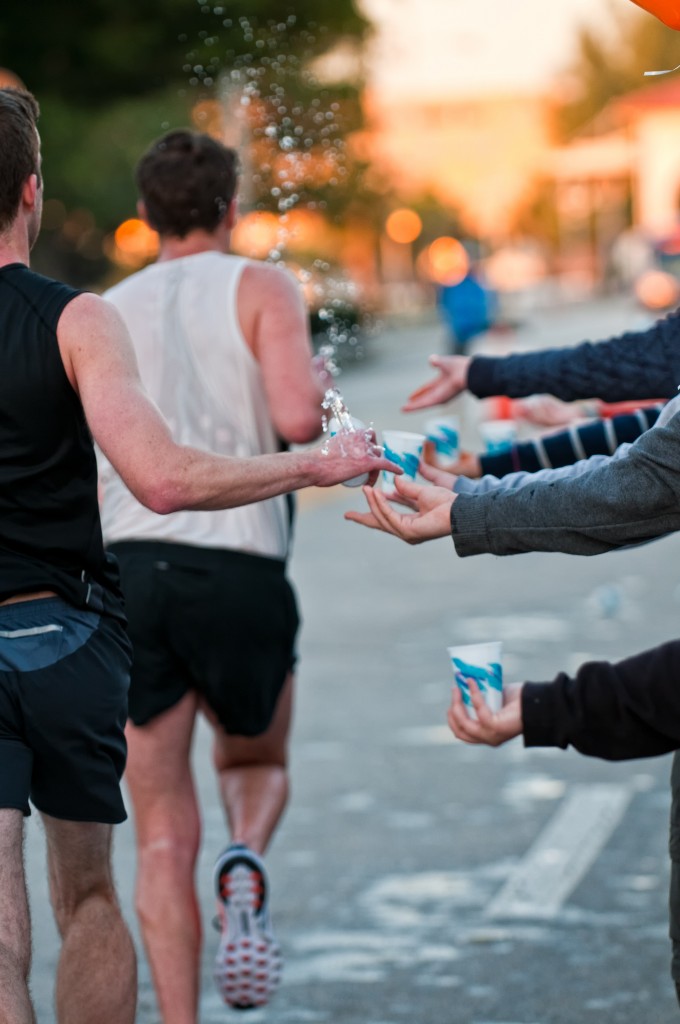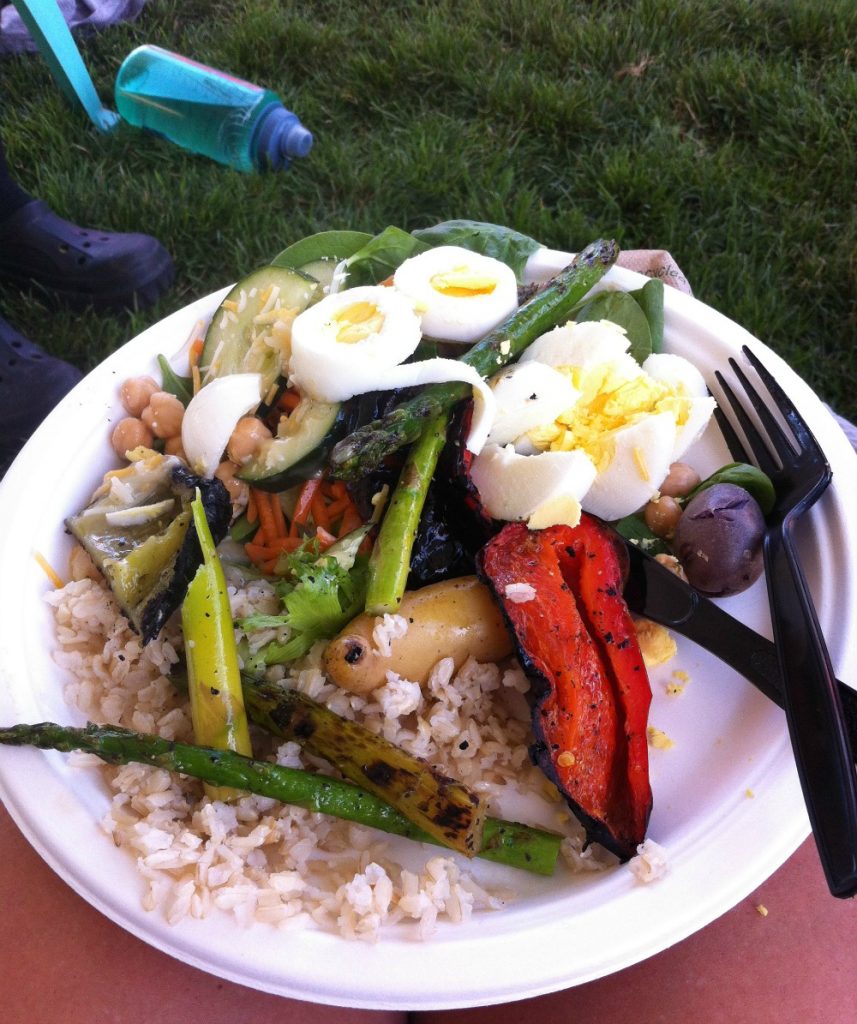Last Updated on April 13, 2020 by Heather Hart, ACSM EP, CSCS
I’m fairly certain there is not a runner on earth that doesn’t aspire to get better at running. It’s why we spend so much time focusing on training, or the exact weight in ounces of our shoes, or the latest app or gadget to track our training. But let’s talk about the non running mistakes you might be making right now, that might completely sabotage your training. Yes, things that have nothing to do with running.

5 Non Running Mistakes that May Be Sabotaging Your Running
You see, when it comes to training for a race, runners are often hyper focused on mileage and paces. Specifically, they want to make sure they cover the distances at the speed they are supposed to based on a given training plan. For many, hitting those numbers can feel like the ultimate deal breaker for performance. However, there are a number of other, non-running habits that have nothing to do with running at all that may actually positively – or negatively- impact training…and you might not even know it.
1. Not Getting Enough Sleep
Do you get enough sleep every night?
(I can almost feel all of the new moms and dads giving me an evil stare through the computer screen. Sorry, I feel for you. I remember it like it was yesterday!)
If you answered no…you aren’t alone. According to the Centers for Disease Control, 1 in 3 adults in the USA do not get the recommended 7 or more hours of sleep a day (source). But before you declare that you’re body has learned to function on just a handful of hours a night, let’s look at how a lack of sleep affects running.
Heal While you Sleep
Human growth hormone (HGH) is a complex protein produced by the pituitary gland in the brain, and is one of the primary compounds that allows our muscles to recover, rebuild, and grow. Our bodies need HGH to use the amino acids – the literal building blocks of muscle – we take from protein to help repair damaged muscle tissue. Up to 75% of HGH is released in the body at night while you are sleeping. Inconsistent sleep patterns can affect adequate release of HGH. Further research shows that a lack of adequate sleep can actually cause muscle mass to decrease (source).
Therefore, besides ensuring that your body and mind are both well rested, sleep is absolutely imperative for healing your body from the damage of training, as well as making that body stronger.
How much sleep do you need? It definitely varies person to person, but experts agree that adults need a minimum of 7-8 hours nightly, and athletes aim for closer to 8-10 hours.
2. Not Obeying Rest Days
This is one of the non running mistakes that I know many are guilty of. As a coach, one of the first things I drill into new clients is the idea that rest days are not optional. They are an integral part of training, just as important as long run days and race pace days.
Preventing Physical Burnout
The obvious benefit of a rest day is just that: you are giving your body rest. But so much more happens during those periods of downtime. Your muscles, joints, and bones are given a chance to repair and recover on a cellular level, as well as adapt to the training volume imposed on them in the workouts prior to the rest day.

Preventing Mental Burnout
Emotionally you are helping to prevent mental burnout. You can catch up on sleep, housework, or Netflix. Plus, chances are your family and friends will enjoy spending that extra time with you.
My advice? Enjoy rest days. Do not think of them as punishment, or a day where you are “losing” fitness. If anything, scheduled rest days actually aid in increasing your overall fitness.
3. Ignoring Strength Training
Specificity of training is a huge component to successful running. In layman’s terms: in order to improve your running, you must run. Unfortunately for many runners, ALL they do is run, ignoring the benefits of strength training. Strength training can help make you stronger, faster, is vital in helping to help prevent injury, and will contribute to your overall health and fitness levels. And we’re not just talking legs: a strong core and upper body will both aid in proper running form as well as preventing overall fatigue.
Read more: Strength Training for Runners – Why You Need to Pick Up that Weight
A common misconception is that strength training requires a) membership to a gym, and b) a ton of time. Neither are true. In fact, a quick 30 minute circuit that covers all of the major muscle groups, completed 2-3 times per week, can make a world of difference in your running. Further, while I love my time in the gym, I’ll be the first to admit that you don’t need one to make strength gains. Body weight and dumbbell exercises can be done in the comfort of your own home, with little to no equipment.

read more: No Equipment Necessary Core Strength Exercises for Runners
4. Dehydration
Do you drink enough fluids? Proper hydration status is absolutely vital to runners for a number of reasons. First, water is necessary for pretty much every bodily function that exists. Water truly is life, we really will die without it. I’m pretty sure most of us learned this in middle school science.
On a performance level, dehydration can cause a decrease in blood volume. When blood volume decreases, your heart has to work to deliver oxygen to your working muscles. Higher heart rate = harder effort. Dehydration can also cause earlier onset muscle fatigue, a lack of mental clarity, and delayed or slower recovery times. And when recovery is impeded by dehydration, future workouts will suffer as well.

In short: it’s imperative that you drink up. And as far as non running mistakes go, this is an easily preventable one.
But how much water is enough?
The previous wisdom of “8 – 10 glasses a day” has been replaced by a more specific suggestion. Experts now suggest the following equations to meet the bare minimum hydration requirements for normal bodily functions:
For men, in fluid ounces:
Body Weight x .35
For women, in fluid ounces:
Body Weight x .31
Of course, runners are going to need more than that, based on sweat rate, workout volume, etc. But these numbers give you a good starting point.
Remember that hydration status is not affected solely by drinking pure water. Any fluids, and foods that are high in water content (such as fruits and vegetables) count towards your overall fluid consumption.
5. Improper Fueling
Nutrition is often one of the hardest battles for many people, so it’s no surprise that this makes the list of non running mistakes. In the case of athletes such as runners, it’s important to remember that nutrition is not simply about weight gain or weight loss. The quality AND quantity of the calories you consume can have a significant impact on your training. In other words: just because you burned 1,000 calories on your run this morning doesn’t necessarily mean you should refuel with 1,000 calories of chips, queso, and cupcakes (much to my dismay).
Proper nutrition and adequate calorie consumption will help fuel your runs and speed up repair of damaged muscles and other tissues. Poor nutrition and a lack of calories can leave you feeling sluggish and lethargic, can impede proper recovery, and can hinder sleep patterns.

This is the part of the post where I declare that I am not a registered dietician, and cannot tell you exactly how many calories YOU need per day, nor exactly WHAT you should eat. I will say that a diet consisting of tons of vegetables, fruits, protein (and it can be 100% plant based!) and whole grains is typically what is recommended for most athletes.

To sum this post up: when it comes to training to become a better, stronger runner, running matters. However, there are other factors that absolutely need to be considered to make the MOST out of your training. Look at the big picture: remembering that success as a runner includes a number of non-running factors will help you get closer to your running goals. Take a look at your day to day lifestyle, and see if you can pinpoint – and then prevent – making these non running mistakes.
Heather Hart is an ACSM certified Exercise Physiologist, NSCA Certified Strength and Conditioning Specialist (CSCS), UESCA certified Ultrarunning Coach, RRCA certified Running Coach, co-founder of Hart Strength and Endurance Coaching, and creator of this site, Relentless Forward Commotion. She is a mom of two teen boys, and has been running and racing distances of 5K to 100+ miles for over a decade. Heather has been writing and encouraging others to find a love for fitness and movement since 2009.

Kt Bee
I’m curious about the water formula you provided. I wonder if I am misunderstanding, because as an 120lb woman x .31, I only need 37.2 ounces of water a day? I wouldn’t survive on that! Where did I go wrong?
Heather
Hi Kt! You aren’t misunderstanding. That equation is the bare minimum needed for bodily functions. Runners of course will need more to replace fluids lost through sweat. Research has shown the 8-10 glasses a day to be an over estimate for most. And it makes sense, when you think about it, different body sizes are going to have different requirements. All of that said, you’d be surprised how LITTLE some people drink! I’ve worked with clients in the gym who came to me and claimed they would MAYBE drink one 12 oz bottle of water a day, at most! I couldn’t survive on that either, but some people do!
Jamie King
I fail regularly at almost all of these, aside from eating. HA!